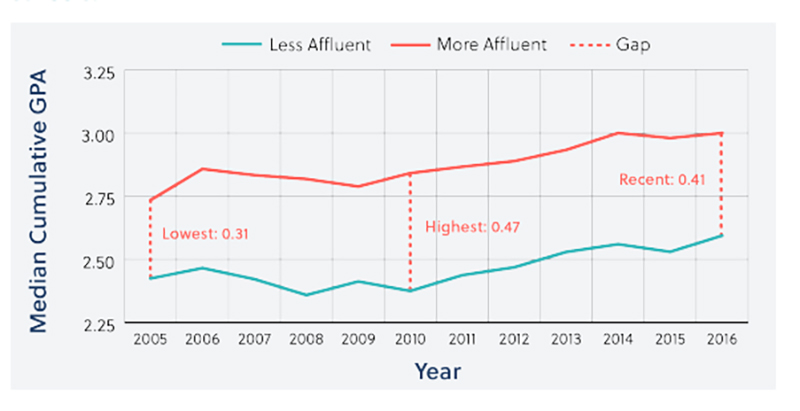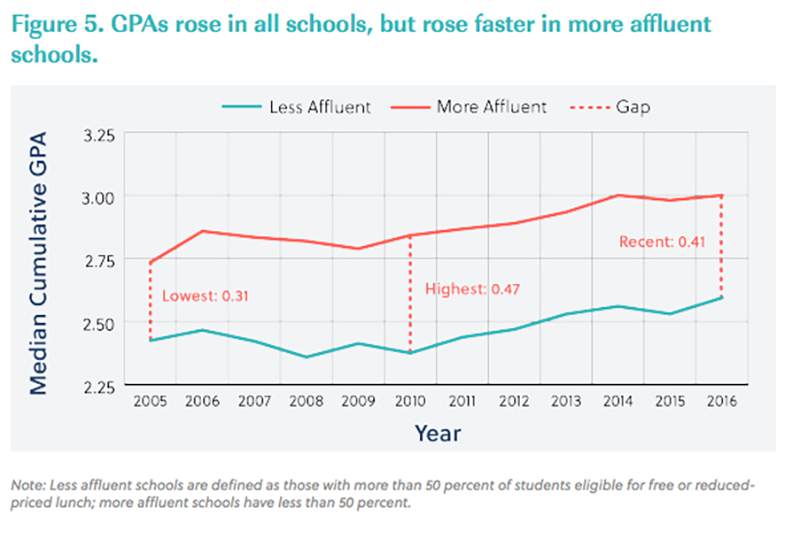Study: Grade Inflation More Prevalent at Wealthy Schools, Where Parents Have Greater Ability to Game the System

This is the latest article in The 74’s ongoing ‘Big Picture’ series, bringing American education into sharper focus through new research and data. Go Deeper: See our full series.
Grade inflation — the phenomenon of large numbers of students receiving ever-higher grades in class, regardless of how much they’ve actually learned — is more prevalent in higher-income schools than less affluent ones, according to research released today by the Fordham Institute. Many pupils who received passing grades nevertheless failed to score proficient on their end-of-course exam for the same subject, the author found.
The study was authored by Seth Gershenson, an education economist at American University. Fordham is a reform-oriented think tank that has issued influential publications warning against false notions of academic success common among American students.
The undeniable trend toward grade inflation has raised concerns in recent years, with high school graduation rates soaring around the country even as students make no comparable progress on benchmark tests like the National Assessment of Educational Progress. In a few high-profile examples, swaths of high schoolers have been granted diplomas despite falling far short of their schools’ academic and attendance requirements.
Previous studies — including one last year from College Board analyst Michael Hurwitz — have also pointed toward steadily rising average high school grades occurring alongside stagnant SAT scores, and noted that the problem is particularly evident in wealthier schools. But critics have pushed back, arguing that organizations like the College Board (which owns the SAT) have an interest in maintaining the supremacy of college entrance exams. GPA, they assert, tends to be an accurate predictor of academic success in college.
Unlike the College Board report, which relied heavily on data from students who had taken the SAT (and who were therefore somewhat less representative of typical students, many of whom do not take the exam), Gershenson gathered student-level data for more than a million North Carolina students enrolled in an Algebra 1 course between 2005 and 2016. Since that subject is accompanied by a mandatory end-of-course (EOC) exam, it provided a good vantage onto the divergence between course grades and test scores.
While students who scored high on the EOC exam tended to also earn a high course grade, Gershenson found that the reverse was not always true. Just 21 percent of students who received an A and 3 percent who received a B ended up earning a “superior” designation (the exam’s highest proficiency level). One-third of students who earned B grades failed to score proficient, according to the exam’s standards.
In an interview with The 74, Gershenson explained that false impressions of proficiency, even if delivered with good intentions, can be damaging if they instill undue complacency among students and parents.
“Algebra 1 is an important class in that it’s a gateway to the next math sequence,” he said. “If you get a passing grade on your report card even though you’re failing to master the material … you’re not going to go out of your way to get more study time or tutoring or help to get caught up. And as a result, you move on to the next stage of your educational career set up to struggle.”
Even more striking, not all students’ grades are inflating at the same rate. In the period Gershenson measured, GPA rose by an average of .27 points in affluent schools, compared with just .17 points in those that were less affluent. Not only does that provide an edge to already advantaged students, it could also amplify the disparity in expectations and confidence between middle-class students and their low-income peers, who are less likely to apply to selective colleges even if their transcripts and test scores merit it.

Higher-income schools are likelier to feature college counselors and pushy parents willing to ask a teacher to consider raising C-pluses to Bs and Bs to As. According to Stuart Rojstaczer, a writer and former academic who has focused heavily on grade inflation in both K-12 and higher education, less fortunate parents may not have the same bandwidth.
“Many [wealthy] parents have been trying to game the education system for future career advantages since their children were toddlers,” he told The 74 in an email. “They certainly aren’t going to stop doing that in high school. Parents without wealth don’t usually have the time, energy, or resources to game the education of their children for future career advantages.”
Even experts concerned about grade inflation agree that GPA is a worthwhile indicator of student achievement. It is generally believed that grades and test scores measure distinct attributes: While scores more aptly capture subject mastery and cognitive skill, grades give a broader picture that includes diligence, attendance, and participation.
Jack Buckley, a senior vice president at the American Institutes for Research and a former College Board staffer who helped revise the SAT several years ago, agreed that the two metrics were actually complementary. Still, he said, the “inflation gap” along the income curve is concerning.
“High school grades right now, on average, are as good a predictor as college entrance exams of your success in college,” he said in an interview. “When you use both of them together, you’ll do a better job of predicting college success. I do think, though, that … the fact that it seems to benefit certain types of students and families disproportionately … calls into question the long-term predictive power of grades, and it’s something that admissions people at selective schools should at least be monitoring.”
Though he acknowledges the value of course grades, Gershenson concluded that grade inflation is indeed a cause for worry. The false signals, he said, were too pernicious to ignore.
“These are real issues that are sending real signals to parents and principals and school counselors and teachers about what kids are excelling at or need help with. And when those signals are wrong, everyone with a stake in a child’s success — including the child — can make not-so-great decisions about how they allocate their time.”
Disclosure: Kevin Mahnken was an editorial associate at the Thomas B. Fordham Institute from 2014 to 2016.
Help fund stories like this. Donate now!

;)
